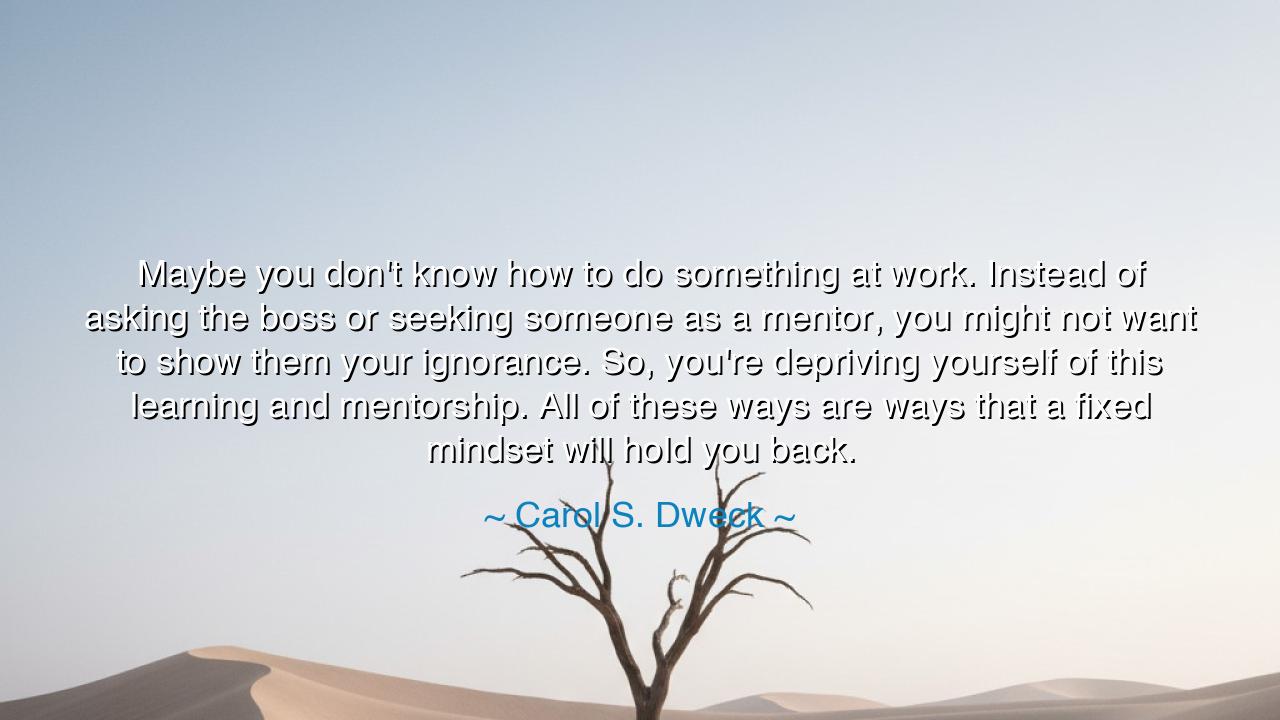
Maybe you don't know how to do something at work. Instead of
Maybe you don't know how to do something at work. Instead of asking the boss or seeking someone as a mentor, you might not want to show them your ignorance. So, you're depriving yourself of this learning and mentorship. All of these ways are ways that a fixed mindset will hold you back.






When Carol S. Dweck said, “Maybe you don't know how to do something at work. Instead of asking the boss or seeking someone as a mentor, you might not want to show them your ignorance. So, you're depriving yourself of this learning and mentorship. All of these ways are ways that a fixed mindset will hold you back,” she spoke not just as a scholar, but as a wise observer of the human soul. Her words pierce to the heart of one of the oldest truths in human growth — that pride blinds, but humility transforms. In her teaching, she reveals the silent trap of the fixed mindset — the belief that our abilities are static and our worth is measured by appearing capable, rather than by daring to grow.
The origin of this quote lies in Dweck’s groundbreaking research on the psychology of learning and achievement. She discovered that people generally approach challenges with one of two attitudes: a fixed mindset, which sees talent as unchangeable, or a growth mindset, which sees ability as a living thing — nourished by effort, patience, and failure. Her insight was revolutionary because it exposed how our fear of looking foolish, our reluctance to admit ignorance, becomes the very wall that blocks our progress. By protecting our pride, we imprison our potential.
To hide one’s ignorance, Dweck warns, is to deny the self its own evolution. This truth was known even in the ancient schools of wisdom. When Socrates declared, “I know that I know nothing,” he was not confessing weakness — he was wielding strength. His humility was his gateway to mastery. Those who pretend to already know cannot learn; those who admit they do not know invite the universe to teach them. Thus, the philosopher’s heart and the student’s heart are one — open, curious, and unafraid of imperfection.
We see this lesson played out time and again in history. Consider the young Leonardo da Vinci, who as an apprentice swept the floors of Verrocchio’s workshop while secretly observing, questioning, and absorbing every technique of the master. He did not feign knowledge; he sought it. When his teacher handed him brushes and pigments, Leonardo’s humility transformed him from student to genius. Had he refused to ask, had he feared the embarrassment of ignorance, the world might never have known The Last Supper or The Mona Lisa. Every great mind has knelt first in the dust of not-knowing.
What Dweck calls the fixed mindset is, in truth, the modern form of ancient hubris — that fatal pride that causes men and women to cling to appearance instead of truth. It whispers, “If you admit your weakness, they will see your failure.” But the wise know the opposite is true: when you embrace your weakness, you begin to turn it into strength. To ask for guidance is not to kneel before another, but to rise higher with their hand. To seek mentorship is to join the unbroken lineage of those who learned through others — the lineage that stretches from the philosophers of Greece to the artisans of the Renaissance, to every teacher and student who ever dared to share wisdom freely.
The lesson of Dweck’s words is therefore not only about learning, but about courage. It takes great strength to say, “I do not know.” It takes deeper wisdom to seek help without shame. In doing so, one awakens the growth mindset, which sees every obstacle as a stepping stone, every mistake as a teacher, and every question as a doorway to deeper mastery. The mind that is humble remains fertile; the mind that is proud withers in isolation.
So, to those who would learn and lead, let this be your creed: never fear the mirror of ignorance, for in it you see the path forward. Ask boldly. Seek mentors as travelers seek maps. Cherish correction, for it refines your craft. The truly strong are not those who pretend to know all things, but those who never cease to learn. As Carol S. Dweck teaches, it is not our failures that hold us back — it is our fear of being seen as imperfect. Break that fear, and the walls of limitation crumble. Embrace the student within you always, for in the humility of learning lies the eternity of growth.






AAdministratorAdministrator
Welcome, honored guests. Please leave a comment, we will respond soon